- Home
- Andy McNab
Spoken from the Front Page 8
Spoken from the Front Read online
Page 8
As you can imagine, the work is pretty full on and tiring. It's literally non-stop from 0630, when I get up, until 2030 or later when we have our final briefing – and no days off. On Fridays the morning briefing is later, at 0930, to give everyone a lie-in. I've already been out on two patrols in Lash [Lashkar Gah] – yesterday we went out to visit the women's centre and girls' school. Nobody's really visited those places before because it's difficult for male soldiers to interact with the women. We also took the Danish CIMIC [Civil Military Co-operation] team because they do reconstruction work and want to carry out some projects at the women's centre and school. So we've decided I'll be the point of contact for the women now, for both CIMIC and PsyOps. We're hoping the women will be more comfortable talking to me.
We went to the girls' school first, a big single-storey building in the middle of a huge open space in the town. But it's incredibly derelict, just grey concrete rooms really, no windows, just holes, and the surrounding area is just rocky, sandy dust. It's guarded by armed ANP [Afghan National Police], but they're corrupt and useless. None of the people trust them – most of them work for the Taliban in their spare time. They pay them more and give them motorbikes. We spoke to the headmistress for about twenty minutes – she's been threatened by phone and by 'night letters' for running the school. They threatened to shoot her or cut her fingers off. She asked for a safe-house, but we can't give her that. It's very sad, really. There are 125 teachers at the school, teaching hundreds of girls in shifts, and they have literally nothing, so we give them radios, school packs, things like that, and CIMIC build them wells and improve the buildings. But we're not supposed to be creating a reliance on us, just facilitating them helping themselves.
The women's centre was equally inspiring – it's run by a woman who arranges English language, computer and cooking classes for about fifty. They get threatened on their way there – two I spoke to were in the back of a car when a man emptied an AK-47 into their driver. Yet they still turn up – they told me all they want to do is learn office skills and be allowed to work. But, again, their facilities are rubbish and they have to put their own guard on the gate. Nobody provides one for them. We gave them a huge supply of sanitary towels and hygiene kits (just things like soap and toothpaste), and they were so grateful. It's amazing what you take for granted.
This morning I was out on a familiarization patrol. We were taken all over Lashkar Gah to see the various buildings of interest, and the shoddily policed check-points, and we drove through the market and waved at the little children who run behind the vehicles. A lot of them stare and point, then collapse in giggles, when they realize I'm a girl ...
On that note, an Afghan gentleman came into the office today. He looked utterly shocked when I told him I'm the new boss! He pointed at me and said, 'YOU?' He runs a school and wants computers for the kids. He did smile and shake my hand, though, so I reckon he sees me as some sort of strange foreign alien from another world. Not quite a woman, not quite a man, but something in between ... That's what my interpreter said. It's gonna be so weird here.
3 September 2006
McNab: The RAF's ageing fleet of Nimrod reconnaissance aircraft was grounded after a crash in Afghanistan claimed the lives of all fourteen on board. It was the worst single military loss of life since the Falklands War of 1982. The end for the twenty-nine-year-old Nimrod MR2, near Kandahar, came during the most intensive period of fighting in Afghanistan since the fall of the Taliban in 2001. It was carrying twelve airmen from 120 Squadron, one Royal Marine and one soldier from the Parachute Regiment. The aircraft was flying at about 10,000 feet when flames started coming from the tail as it fell to the ground. The accident meant British troops had now suffered thirty-six deaths in Afghanistan since 2001.
September 2006
Major Maria Holliday, QGM, Royal Military Police (RMP)
Sometimes we would escort high-value targets [Taliban suspects] to Kabul on behalf of the Afghans because they didn't really have the resources to do it. Quite often, if we couldn't get the evidence, the detainees would have to be released. But when there was sufficient evidence to support an allegation that they were a member of the Taliban, they would be handed over to the Afghan authorities. They might have been arrested if they were in possession of a firearm or if they were seen to be firing at UK troops, or perhaps if they were in possession of documentation that would suggest they were a member of the Taliban. It was exactly the same sort of evidence that would be required in the UK. But once we had handed them over, we would have to monitor how they were being treated. We would visit the Afghan jails and speak to the detainees to make sure they were being treated correctly. We had a moral duty of care, if you like. There were no examples of mistreatment during our tour. The [RMP] boys, when they first went down there [to Lashkar Gah], expected to find really bad conditions, but they were OK. The jails were very, very basic but the cells were kept clean. Sometimes the Afghans did surprise us – they were better organized than we expected.
One particular incident springs to mind. The chief of police for Helmand province in Lashkar Gah asked me to go and visit a young girl called Leila. She was sixteen and had been put into the prison in Lashkar Gah. The reason she had been jailed was that she had run away from her family and had gone to Kandahar. She was hoping to get married to a young lad there but she had been found in Kandahar, arrested and taken back to Helmand province. The chief of police was concerned that if she was released back to her brother – who was the head of the family because she did not have a mum or dad – she might be subjected to an honour killing because she was said to have brought shame on her family by running away.
I did chat with her in jail in early September, towards the end of the tour. I went to the prison in Lash, and doubled it up with a check on a detainee, caught by the British, who had been sentenced and put into the prison. I asked the prison governor if I could visit the girls in the prison. It is the same prison as the men but the women were held separately. I was led through a myriad gates and compounds and eventually reached the women. There were five girls with some little children because they take the children into prison with them. There was a female prison warder, and they were all dressed in civilian clothes. I was asking, through an interpreter, why they were there. A seventeen-year-old girl had been given a seven-year sentence for adultery and a fourteen-year-old had been accused of adultery. She was awaiting sentence, but she was so shy and frightened, she kept hiding her face. You could see she was a young teenage girl. I remember thinking there was no way that girl had committed adultery or, if she had, it had not been of her own volition. It was awful to see her. In the UK, if everyone got locked up for committing adultery, half the population would be in prison!
There was a female medic who had gone with me to the prison as well – we took some toys and sweets for the kids because we knew there would be children in there. To start with, the sixteen-year-old we had gone to see wasn't there, but while we were chatting, she came back. She had just been in court and I managed to speak to her. She was very feisty: I was quite impressed with her. She talked through an interpreter but you could tell from her tone of voice that she was quite defiant. I asked why she had run away from home. She said she had gone to Kandahar because she wanted to be a policewoman. In Kandahar, there were a number of policewomen but there were none in Helmand province. All police were male in Helmand. She said she wanted to become a policewoman and she wanted to get married but she was adamant that she did not want to be released to her brother. I asked her if she would be in danger and she was quite noncommittal. I went back to the chief of police and I passed on my concerns to him, but he was in a difficult position because it was going to be dealt with by the courts and Afghan law. I often think about Leila because I have no idea what happened to her. I passed the information on to a lady working for the Foreign Office, so she was aware of the case before I left.
September 2006
McNab: Christopher 'Has' Hasler was told th
at he had become the first flying officer [he is now a flight lieutenant] since the Second World War to be awarded the Distinguished Flying Cross (DFC). This is his previously unpublished CO's report in which Hasler is recommended for a gallantry award:
In May 2006, Flying Officer Hasler was detached with his Flight as part of the Joint Helicopter Force (Afghanistan), JHF (A) in support of Operation HERRICK. Hasler flew initially as a co-pilot, owing to his relative inexperience, but soon proved capable of fulfilling the role of aircraft captain. Hasler was actively involved in many high-risk sorties and displayed consistently the highest standards of gallantry and professionalism. Towards the end of his tour he was appointed captain for a number of key missions.
At dawn on 7 July 2006, Hasler led a formation of two Chinooks into the area of Sangin. The mission was to provide an essential resupply and extraction for a 3 PARA BG [Brigade] Company. The dangers involved were extremely high. The day before, Hasler had attempted the same mission, but he had to abort because a Paratrooper had been killed by enemy fire while securing the helicopter landing site. To mitigate the risk to the aircraft, Hasler elected to land in an 'unlikely' site in order to achieve surprise. The site was surrounded by buildings on three sides and would make the landing particularly difficult. Undaunted, Hasler displayed great bravery, maturity and handling skills well beyond his experience, in leading his formation into Sangin and landing his aircraft successfully, just after dawn. He then safely offloaded the vital stores before manoeuvring his aircraft quickly, but with supreme accuracy, to allow a number of troops to embark. Again, Hasler needed the highest degree of skill and composure to do this. As he repositioned, he intentionally placed the aircraft's rotor disc just above a single-storey rooftop. Any error would almost certainly have resulted in catastrophic damage to the aircraft. The mission proved to be a complete success.
On 14 July, Hasler commanded the third aircraft of a fiveship Chinook assault into Sangin, a Taliban stronghold and area of recent high enemy activity, as part of Operation AUGUSTUS. Hasler's aircraft was the last of three to land in the first wave; the second wave of two Chinooks eventually aborted their landing due to the heavy weight of enemy fire on the landing site; fire from enemy who were awake, fully alert and expecting the landing. Although a heavy fire-fight against 30–40 Taliban was already under way, and there was a strong possibility of the assault force being split and overwhelmed, Hasler displayed tremendous bravery and commitment and skilfully landed his aircraft, even though small arms and Rocket-propelled Grenades were being fired at his and other landing Chinooks. Whilst under effective enemy fire, Hasler held his nerve and his aircraft on the ground to allow his troops to disembark into the hottest of the helicopter landing sites, before taking off. Hasler's brave decision to do this enabled overpowering numbers of friendly forces to quickly suppress the enemy positions and for the mission to succeed with minimum UK casualties.
Throughout his 10-week detachment, Hasler displayed great courage and composure, despite his relative inexperience. He maintained the highest standards of professionalism and airmanship in what was an extremely arduous, high-tempo flying tour in the most demanding, high-risk environment in which the Chinook Force has operated in its recent history.
September 2006
Colour Sergeant Richie Whitehead, Royal Marines
I was taking out one of the multiples. The intended multiple commander [MC] was still on course back in the UK so, because I was a spare floating MC, I was helping out everyone, showing people the lie of the land. We – a section of twelve blokes – were out on the southern side of Lashkar Gah, the southern side of the airport. We had recently had IEDs handed in so we were looking around the airport making sure there was no suspicious business. Even though we had got GPS [global positioning system] and maps, it was pitch black and nine times out of ten you made a wrong turn – and I did on this occasion.
In and around a built-up area, I came to a dead end. It was around midnight. I said: 'It's my fault. U-turn.' Everyone was giving me numerous shit over the radio so we turned around and started to come back. But as we'd turned our headlights had gone over the horizon at some stage, and this had been picked up by somebody. So we were just about to drive out of the built-up area, a dead-end alley that I had gone down, when all of a sudden there was Dushka fire at our vehicles from the left. A Dushka is a 12.7 Russian machine-gun. A big, heavy, slow thing. So, obviously, we stopped, switched our lights off. I was in an open-top WMIK and we reversed back in. All the lads had broken cover, contact reports had been sent, etc., etc. As soon as it happened, I thought: No, they [the Taliban] do not drive up to you this close in a town centre and have a pop shot. We were on the south side of them – they were closer into town. If it had been the other way [around], they could have escaped into the desert, but they were not going to escape into town. They wouldn't have done that because they knew we could call other people in.
There were three of us in the WMIK: me, a driver and a gunner on the back. Within a minute, I knew it was a police check-point that had fired on us. From the position and knowing where I was, I realized they were ANP. I had visited the check-point days before. All the lads were getting ready to fire back but I held them off. I told them to chill out. We put lots of para illum [parachute illumination flares] up in the air so they could see us. We were four vehicles – two WMIKs, two Snatch [lightly armoured Land Rovers]. We did this but they kept firing at us. We were not firing. The outcome of me firing or killing ANP at that stage would have wrecked all the hard work that 16 Air Assault and 3 Commando Brigade had done. There were about eight of them. It took forty minutes. Every time we went to move, I was stuck. They were firing at us, mistaking us for Taliban even though we had lit up the area. They could see our vehicle. Whenever we moved forward or back, or put up para illum, or flashed our lights – the Snatch vehicles had spotlights on the top – they fired at us. None of the vehicles got hit but we were pinned down. They were 350 or 300 metres away. Not far. But I couldn't go forward or back. I let zero – the Ops Room – know. They wanted to send out more people but I said, 'No,' because it was gonna cause more chaos. Then they [the ANP] were going to think they were getting attacked. So our interpreter – he was at the back of one of the vehicles and his English was reasonably good – he turned the air blue. He was swearing about these 'poxy, useless police'. So we called them on his loudhailer. And I said to tell them: 'We are British servicemen.' I told him that they must stop firing because, if they didn't, we were going to have to fire on them and we didn't want to do that.
So he spoke to them. All of a sudden the firing stopped. You could see the interpreter was irate and I was trying to calm him down. So I got everyone back on the vehicles, put our hazard warning lights on and we lit the sky up with the last of our para illum. Then we drove down. The ANP were all laughing because they thought it was hilarious. I was obviously not laughing. I grabbed their commander, took his name to pass on to the chief of police. And our interpreter was still swearing. We cleared it up and all came back. Thank Christ for that. For forty-five minutes they were regularly firing with their AK-47s, their Dushka. It was a genuine mistake, but that one was a bit too close for comfort.
9 September 2006 [email home]
Captain Charlotte Cross, Territorial Army
Sorry I haven't been in touch for a bit but I'm sure you've heard there have been quite a lot of deaths/serious injuries out here, and so Op Minimize has been on ... constantly. Plus there's been a bit of a siege mentality in camp ... We had reports of hordes of Taliban on the horizon getting ready to surge into Lashkar Gah, so everything stopped while we waited to be attacked ... I admit I didn't sleep very well for a few days. My body armour is SO heavy. I don't think I'd be able to run very fast or very far in it.
So life's been eventful since I got here 2 weeks ago. We had our first 'incident' on camp on my first night here ... having had no sleep the night before I was pretty knackered, but was woken up at midnight by my new boss dressed i
n full webbing and helmet, etc, complete fighting order, telling me the camp was under deliberate attack and could I please get dressed!!! Plus we had a casualty. The medical room is down the hall from my room, and I recognized that strong smell of disinfectant. So I got up, got dressed, and then basically we all spent a few hours hanging around in the corridors wondering what was going on ... Mainly I was worrying about my lack of ammunition, because having just arrived I'd only been issued one magazine [more magazines were due the next day]. Eventually we were all sent back to bed. I slept in my clothes, just in case.
The next morning, we were told the ANA in town had decided to shoot a group of stray dogs. The ANP or some other ANA thought they were being attacked and returned fire in the general direction of our camp – and some bullets came over the wall, went through one of the tents and hit a captain in the leg. Apparently he'd jumped up when he heard firing, but if he'd stayed in his bed he would've been okay!

 Get Me Out of Here!
Get Me Out of Here!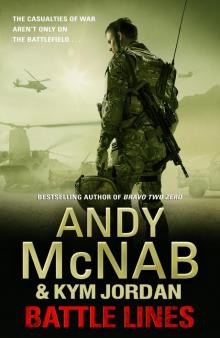 Battle Lines
Battle Lines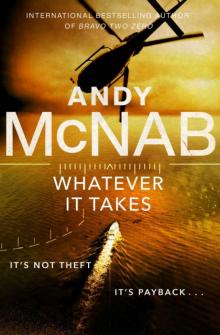 Whatever It Takes
Whatever It Takes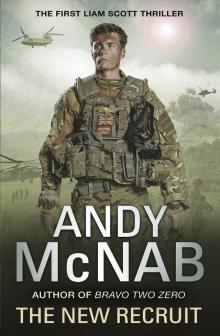 The New Recruit
The New Recruit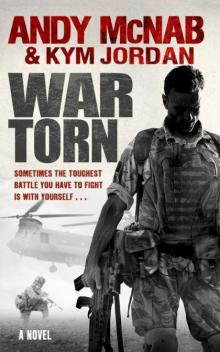 War Torn
War Torn Brute Force
Brute Force Crossfire
Crossfire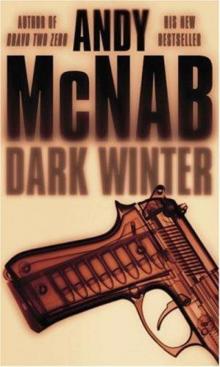 Dark Winter ns-6
Dark Winter ns-6 The Grey Man
The Grey Man Spoken from the Front
Spoken from the Front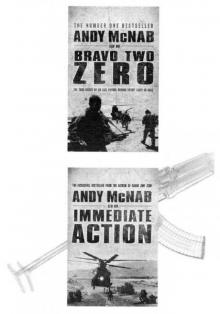 Meltdown
Meltdown Recoil
Recoil Nick Stone 1 - Remote Control.
Nick Stone 1 - Remote Control.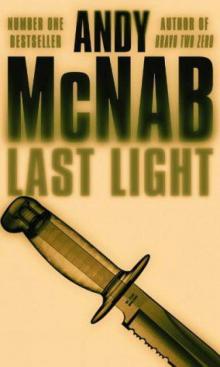 Last Light ns-4
Last Light ns-4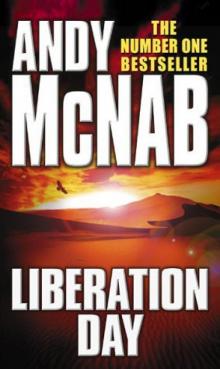 Liberation day
Liberation day Deep Black
Deep Black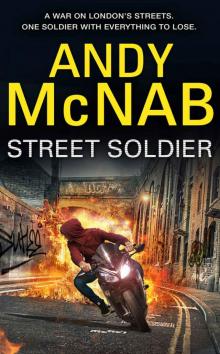 Street Soldier
Street Soldier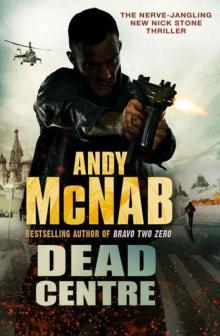 Dead Centre ns-14
Dead Centre ns-14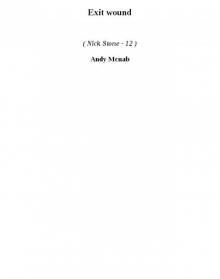 Exit wound ns-12
Exit wound ns-12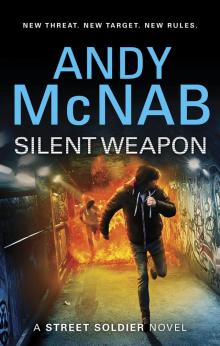 Silent Weapon
Silent Weapon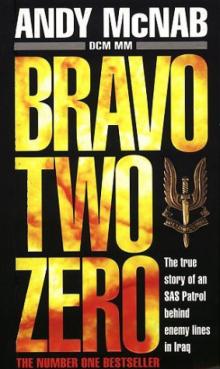 Bravo two zero
Bravo two zero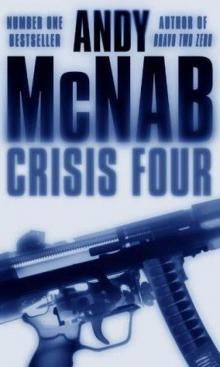 Crisis Four ns-2
Crisis Four ns-2 Red Notice
Red Notice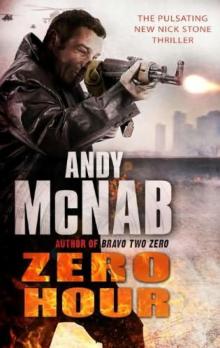 NS13 Zero Hour
NS13 Zero Hour Firewall
Firewall Last Light
Last Light Aggressor
Aggressor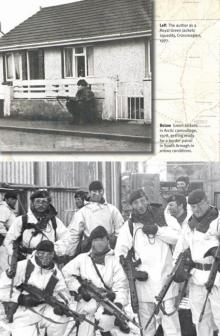 Seven Troop
Seven Troop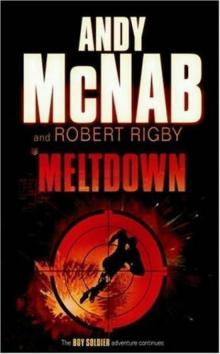 Meltdown bs-4
Meltdown bs-4 The Grey Man (quick reads)
The Grey Man (quick reads)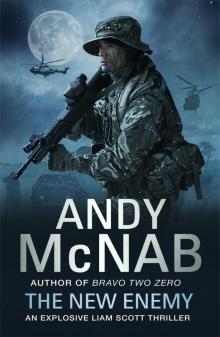 The New Enemy
The New Enemy Avenger
Avenger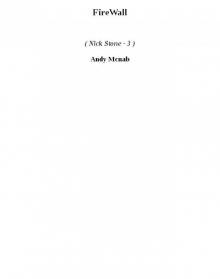 FireWall ns-3
FireWall ns-3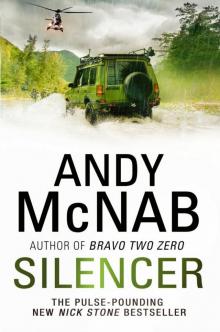 Silencer
Silencer Last Night-Another Soldier…
Last Night-Another Soldier…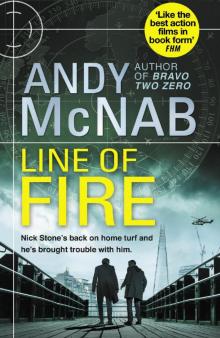 Line of Fire:
Line of Fire: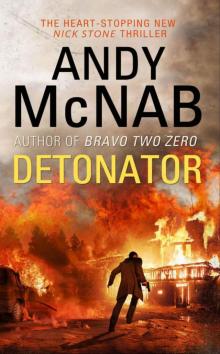 Detonator
Detonator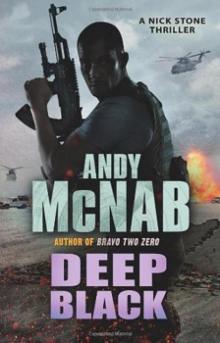 Deep Black ns-7
Deep Black ns-7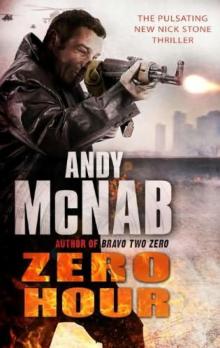 Zero Hour (2010) ns-13
Zero Hour (2010) ns-13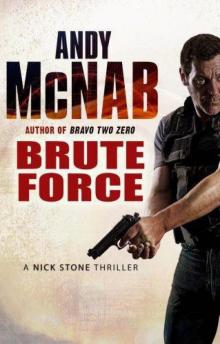 Brute Force ns-11
Brute Force ns-11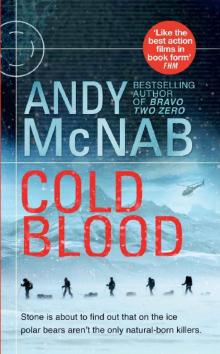 Cold Blood
Cold Blood Terminal Velocity
Terminal Velocity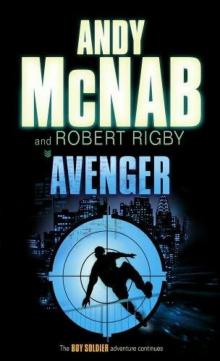 Avenger bs-3
Avenger bs-3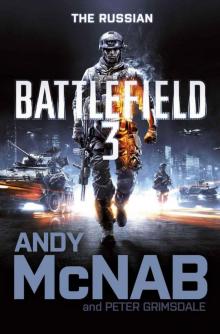 Battlefield 3: The Russian
Battlefield 3: The Russian DropZone
DropZone Zero Hour
Zero Hour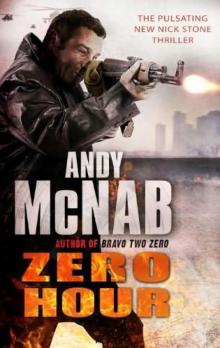 NS13 Zero Hour (2010)
NS13 Zero Hour (2010)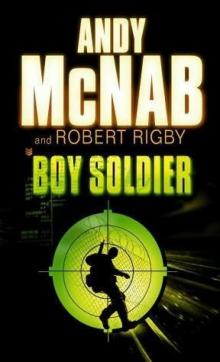 Boy soldier bs-1
Boy soldier bs-1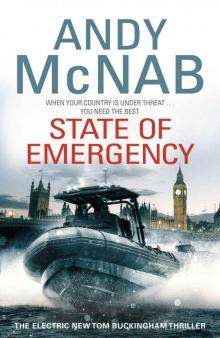 State Of Emergency: (Tom Buckingham Thriller 3)
State Of Emergency: (Tom Buckingham Thriller 3)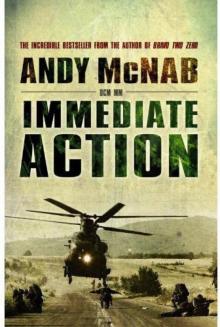 Immediate Action
Immediate Action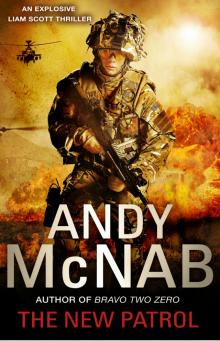 The New Patrol
The New Patrol Crisis Four
Crisis Four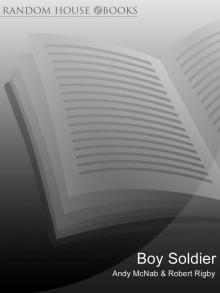 Boy Soldier
Boy Soldier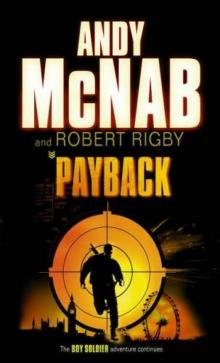 Payback bs-2
Payback bs-2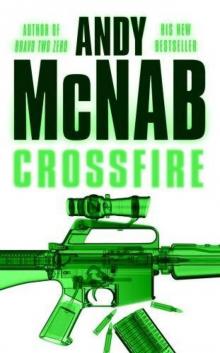 Crossfire ns-10
Crossfire ns-10 Today Everything Changes: Quick Read
Today Everything Changes: Quick Read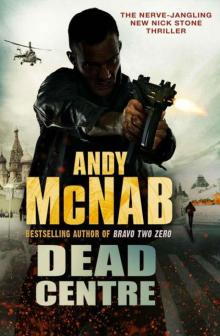 Dead Centre
Dead Centre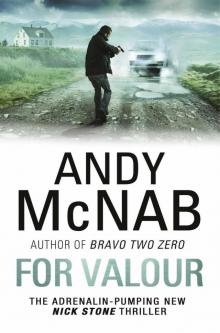 For Valour
For Valour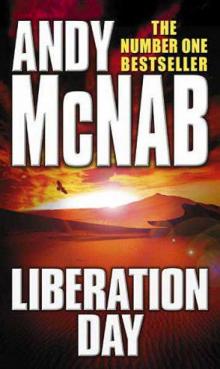 Liberation Day ns-5
Liberation Day ns-5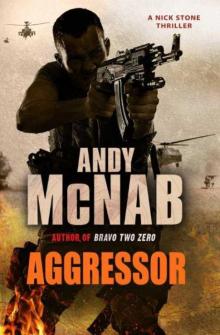 Aggressor ns-8
Aggressor ns-8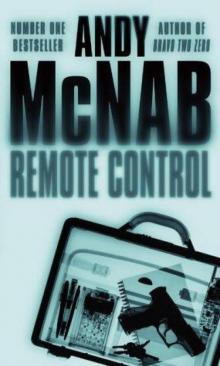 Remote Control ns-1
Remote Control ns-1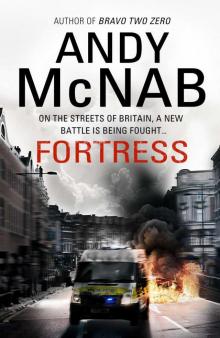 Fortress
Fortress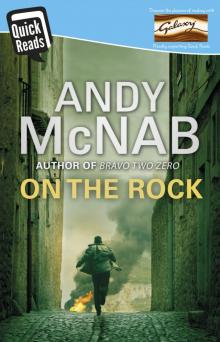 On the Rock
On the Rock Dark Winter
Dark Winter